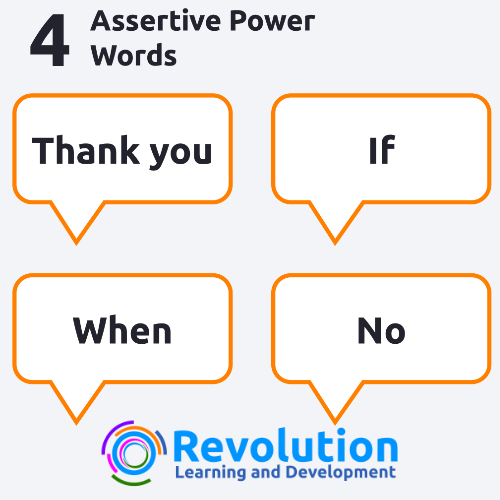Assertive Language
Assertiveness is defined as the art of confident communication. And, as it’s communication, it means we portray assertiveness through body language, our voice and the words that we use.
While body language and voice account for a lot of our ability to communicate, when it comes to assertiveness, words are also vitally important. In this post, we look at 5 words or power words that you can use in your language to be more assertive.
What Are Power Words?
Power words are words that we can use that have an impact. They portray confidence, are clear and also can be used to control a conversation. They make sure that we don’t get taken advantage of and make it easier for others to understand our position.
4 Power Words You Can Use to Be More Assertive

- Thank you
- If
- When
- No
Thank You
We are all taught to say thank you when we ask for something, it’s just common manners: however, something interesting happens when we add thank you to a statement where we would normally say Please.
Used with assertive body language, the use of Thank You can be very powerful.
For example:
- ‘I would like to help me – Thank you’
- ‘I would like you to listen to me now – Thank you’
- ‘I want you to pay attention – Thank you’
So, the mix of the I statement, Thank you and assertive body language means your statement is much more powerful.
If
Add if to a statement if when you want to make a concession or negotiate a compromise.
Maybe your parents did this when you were younger using statements such as ‘If you eat your vegetables you can have your desert’.
The If acts as a piece of elastic which you can pull back if you don’t get what you want. Therefore the if becomes conditional.
For example:
- ‘If you do this then I will….’
- ‘If you improve your performance I will …’
- ‘’If you agree to this you can have…’
Most people in life tend to be too nice and let others have the desert first hoping the other person does the right thing and lets them have what they need – if only life was that simple.
Again, if needs to be coupled with I
When
When is another conjunction similar to If. It needs to be conditional. For example:
- ‘When you…’
- ‘When the task has been completed….’
- ‘When you stop making accusations….’
No
A word we sometimes are afraid of using. But, thinking about your rights, you have every right to say no.
The assertive person will just say no but will think before saying it.
- Do I really want this or am I just pleasing someone else?
- What is the benefit to me of saying yes?
- If I do, will I enjoy it?
- Do I have to say yes or no right now?
- How do I feel about the request?
- Do I need more information before I make my decision?
- Do I want an alternative?
- What is the cost of saying no?
If you are going to say no, then just say no.
Using the same format of I statements is also applicable when you want to say no to people.
When saying NO it is important not to do it with excessive excuses as this may seem as though you are looking for a reason not to do it, you are being dishonest and it may even be seen as blatantly lying.
By all means, start with ‘I’m sorry but…’ or ‘I’m afraid that…’ but only apologise once.
The other person might have a problem, but you have the right to decide whether to give in to them i.e. your friend has no one to go to the cinema with.
A simple, ‘I’m sorry, I’m too tired’ will do.
As well as only apologising once, you only need one genuine reason for saying no.
‘I can’t come to the cinema tonight – I’m too tired’.
There is one important thing to remember with any of these power words. You need to consider how it is delivered. If you don’t use assertive body language or tone, then these words will be seen as being aggressive.
You can read more about saying no by reading the How to Say No post or by reading the How to Say No With Confidence Article.
Assertiveness Skills Training Course
Want to find out more about power words, being assertive and how to use the skills effectively? We deliver an Assertiveness Skills training course as both an open/public training course or an in-house training course.




